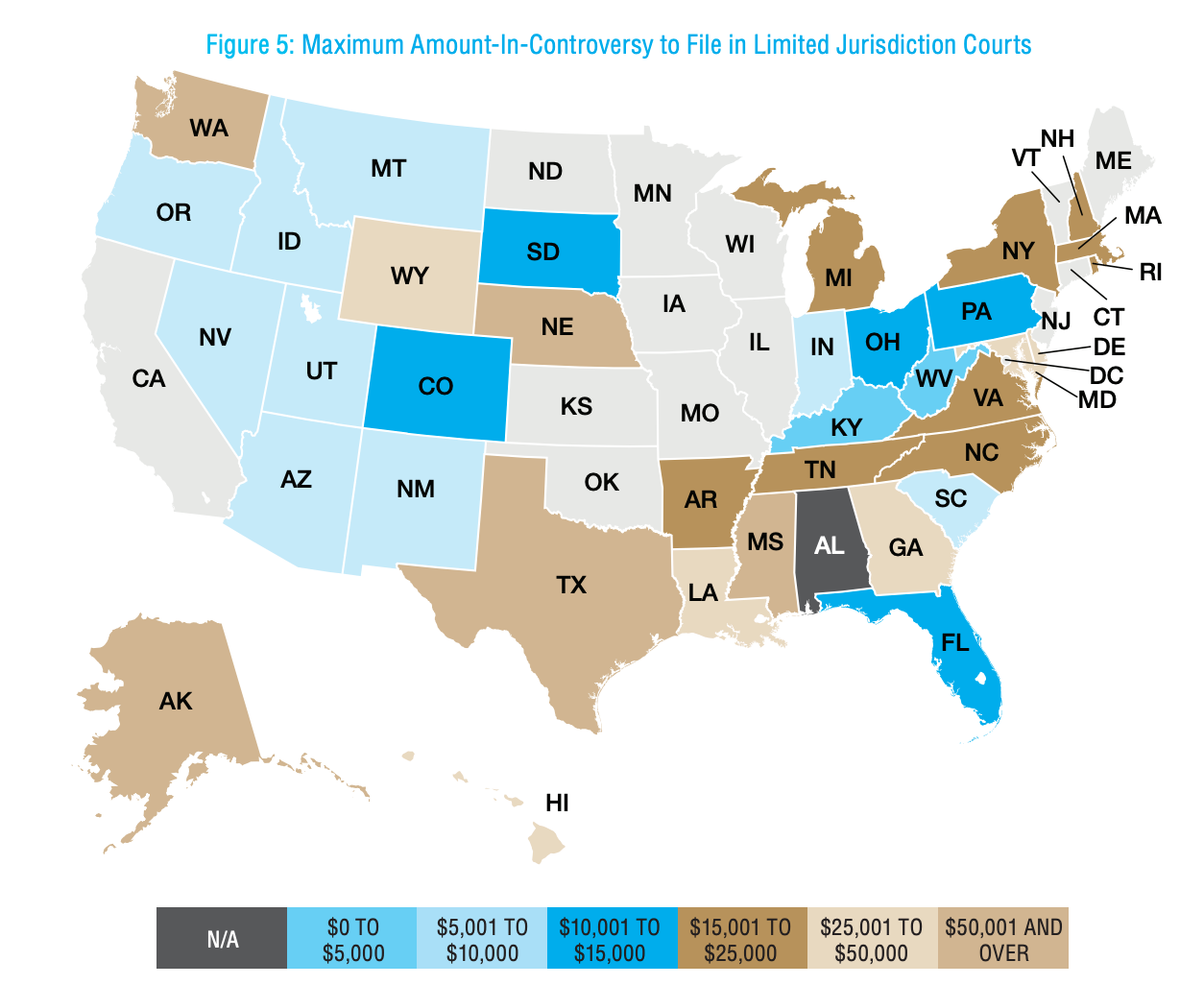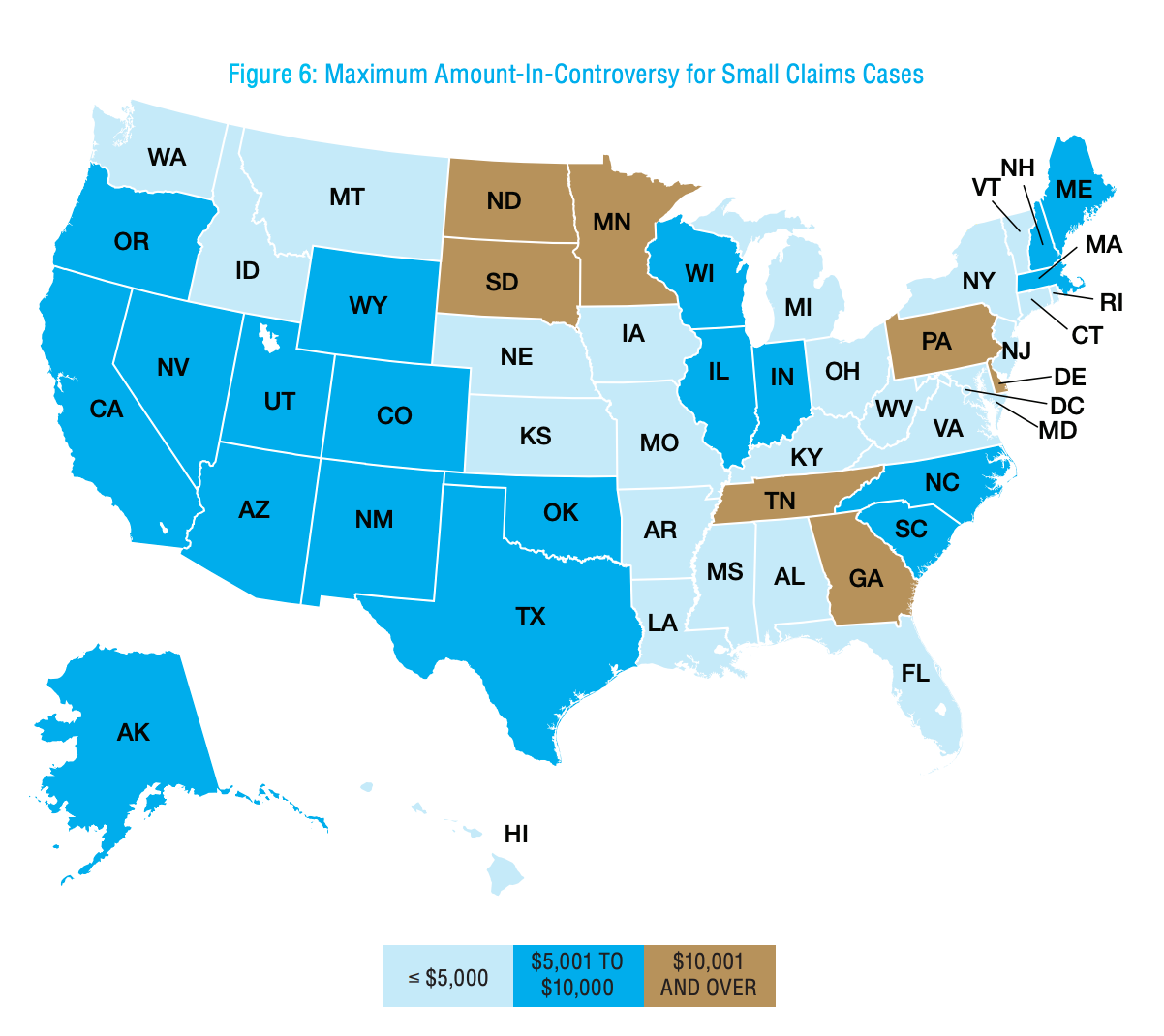By Province/Territory in Canada:
https://neighbourhoodlegal.ca/2022/05/15/small-claims-court-monetary-limit-across-canada/
By State in US:
https://www.nolo.com/legal-encyclopedia/small-claims-suits-how-much-30031.html
-
2Nice question. My guess is that the US has greater legislative inertia in the face of inflation (that is, it adjusts monetary values in its laws less frequently), which one ought to be able to establish by looking at the historical limits, but it may also be possible to identify some underlying causes for the difference in inertia.– phoogCommented Jun 14, 2022 at 16:25
1 Answer
Two factors are at play.
Currency Exchange Rates
First off, don't forget that the Canadian numbers are in Canadian dollars while the U.S. numbers are in U.S. dollars. One Canadian dollars = 0.77 U.S. dollars. The monetary claim limits in U.S. dollars in Canadian courts (at this rate) are as follows:
The Civil Division of the Provincial Court of Alberta hears claims up to $50,000. ($38,500 USD)
The Civil Resolution Tribunal hears claims up to $5,000 ($3,850 USD) The Provincial Court of British Columbia’s Small Claims Court hears claims from $5,001 to $35,000 ($26,950 USD)
The Manitoba Court of Queen’s Bench’s Small Claims Court hears claims up to $15,000. ($11,550 USD)
The Small Claims Court of New Brunswick hears claims up to $20,000. ($15,400 USD)
The Provincial Court of Newfoundland and Labrador’s Small Claims Court hears claims up to $25,000. ($18,250 USD)
The Territorial Court of the Northwest Territories hears claims up to $35,000 ($26,950 USD)
The Nova Scotia Small Claims Court hears claims up to $25,000. ($18,250 USD)
The Nunavut Court of Justice’s Small Claims Court hears claims up to $20,000. ($15,400 USD)
The Ontario Superior Court of Justice’s Small Claims Court hears claims up to $35,000. ($26,950 USD)
The Supreme Court of Prince Edward Island’s Small Claims Court hears claims up to $16,000. ($12,320 USD)
The Small Claims Division at the Court of Québec hears claims up to $15,000. ($11,550 USD)
The Provincial Court of Saskatchewan’s Small Claims Court hears claims up to $30,000. ($23,100 USD)
Yukon’s Small Claims Court hears claims up to $25,000. ($18,250 USD)
The Term "Small Claims Court" Is Used Differently
Second, this isn't an apples to apples comparison. The Canadian limits are for what would be called limited jurisdiction civil courts in the U.S., (except perhaps, British Columbia's Civil Resolution Tribunal) and aren't strictly equivalent to U.S. small claims courts which are a bit like the "Judge Judy" show or "The People's Court" on U.S. television
But, most U.S. jurisdictions distinguish between small claims cases, which have a lower dollar limit and in which plaintiffs cannot commence cases with lawyers, and have an extremely simplified process, and ordinary civil cases in limited jurisdiction courts, which still have lots of parties without lawyers, and have greatly simplified and shortened pretrial civil procedure, but have higher dollar limits and allow either party to be represented by lawyers without limitations.
Most adversarial U.S. limited jurisdiction court cases that are not small claims court cases are filed by professional debt collection firms on behalf of businesses, en masse with many cases resolved by default judgment, or involve protective orders (e.g. in domestic violence situations).
The charts below for U.S. Courts (from here as of 2015 and hence seven years out of date) illustrate the difference. As of 2022, Colorado's limits are $7,500 USD for small claims court and $25,000 for its limited jurisdiction court. Some states, like New York State, have different jurisdictional limits in limited jurisdiction courts in different parts of the state.
According to the body text, some limited jurisdiction courts in the U.S. can entertain claims up to $200,000 USD (i.e. Mississippi and Texas).
Intrastate Federalism
Many courts of limited jurisdiction in the U.S. are part of local governments (e.g. a city or municipal court) rather than part of the state court system. State governments have often been reluctant to grant much authority to civil courts which are outside the state court system (that state legislatures can regulate directly) to local governments.
In contrast, all of the limited jurisdiction courts in Canada are part of either a provincial level court system, or the courts of a self-governing territory (also, while not precisely on point, while Canada has federal courts, the jurisdiction of Canada's federal courts is very limited and the federal court dockets make up only a tiny part of the total judicial system case load in Canada).
-
2As mentionwed in law.stackexchange.com/questions/37564/… several US States allow lawyers in small claims cases, some only under specific circumstances Commented Jun 14, 2022 at 23:11
-
1In addition to the quoted exchange rate, it would not surprise me if the Canadian limits were enacted when the gap was even wider and not updated since. Inertia isn't just for physics. Commented Jun 15, 2022 at 1:29
-
@DavidSiegel Certainly. Given the vast non-uniformity of the law in the area it is hard to summarize. But, I think it is fair to conclude, even so, that the U.S. makes a distinction between "small claims courts" with very simplified procedures and non-small claims process limited jurisdiction courts with intermediate amounts of procedural simplification that only one Canadian province appears to make. Commented Jun 15, 2022 at 20:19

